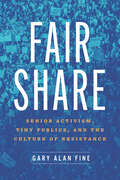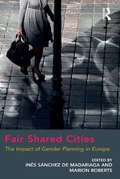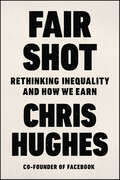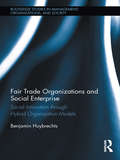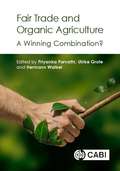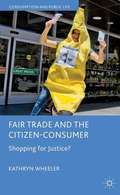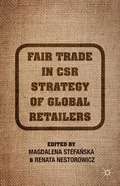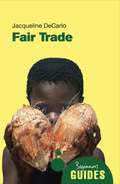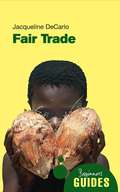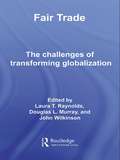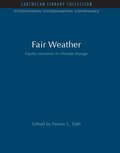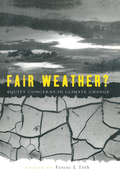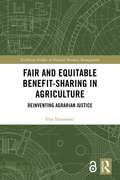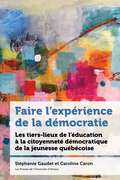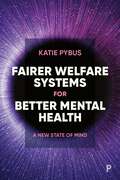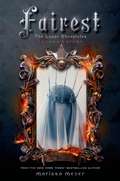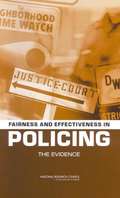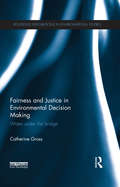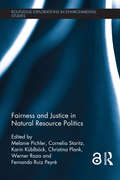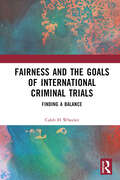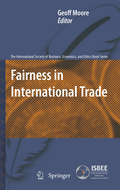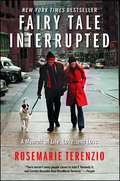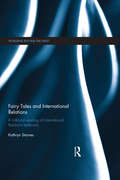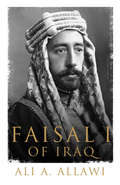- Table View
- List View
Fair Share: Senior Activism, Tiny Publics, and the Culture of Resistance
by Gary Alan FineA deeply researched ethnographic portrait of progressive senior activists in Chicago who demonstrate how a tiny public wields collective power to advocate for broad social change. If you've ever been to a protest or been involved in a movement for social change, you have likely experienced a local culture, one with slogans, jargon, and shared commitments. Though one might think of a cohort of youthful organizers when imagining protest culture, this powerful ethnography from esteemed sociologist Gary Alan Fine explores the world of senior citizens on the front lines of progressive protests. While seniors are a notoriously important—and historically conservative—political cohort, the group Fine calls “Chicago Seniors Together” is a decidedly leftist organization, inspired by the model of Saul Alinsky. The group advocates for social issues, such as affordable housing and healthcare, that affect all sectors of society but take on a particular urgency in the lives of seniors. Seniors connect and mobilize around their distinct experiences but do so in service of concerns that extend beyond themselves. Not only do these seniors experience social issues as seniors—but they use their age as a dramatic visual in advocating for political change. In Fair Share, Fine brings readers into the vital world of an overlooked political group, describing how a “tiny public” mobilizes its demands for broad social change. In investigating this process, he shows that senior citizen activists are particularly savvy about using age to their advantage in social movements. After all, what could be more attention-grabbing than a group of passionate older people determinedly shuffling through snowy streets with canes, in wheelchairs, and holding walkers to demand healthcare equity, risking their own health in the process?
Fair Shared Cities: The Impact of Gender Planning in Europe
by Marion RobertsBringing together a diverse team of leading scholars and professionals, this book offers a variety of insights into ongoing gender mainstreaming policies in Europe with a focus on urban/spatial planning. Gender mainstreaming was first legislated for in the European Union with the Treaty of Amsterdam in 1999 and, although many interesting developments have occurred throughout the decade that followed, there is still much to do in terms of policy, knowledge production, dissemination and education. This work contributes to all three objectives, by advancing the state of knowledge, as well as providing educational and professional tools in the field of gender sensitive planning in Europe. The volume begins by explaining the concept of gender mainstreaming in relation to its origins in the 'second wave' of the women's movement and critiques of planning, architecture, transport planning and other built environment disciplines. It then provides a brief history of how gender mainstreaming was incorporated into European law, before focussing on the theoretical issues and questions that surround the concept of gender mainstreaming as they relate to urban space and the planning of cities and regions, including a discussion of the persistence of inequalities between the sexes in their access to urban space and services. In particular, the division between waged and unwaged work and its impact on the social construction of gender and of the physical built environment is considered. The differences between definitions of feminism and their implications for action in planning and design are also explored, paying regard to the tensions between a feminist vision of a transformation of gender relations and the requirements of gender mainstreaming to accommodate the different needs of women and men in their everyday lives in urban space. Throughout the book, key issues recur, such as the importance of time and space in the experience of urbanism, resistances to change on the part of institutions and social structures, and the importance of networks. Education and training also appear as common themes, as do citizen participation and the structures of governance. The chapters are organised into four sections: concepts, structures, empowerment and spatial quality. Contributors demonstrate a variety of approaches to the intersections of gender, women, cities, and planning, dealing with substantive and procedural issues in planning, at both local and regional scales. They stress the links between environmental sustainability and gender-sensitive urban development. The book concludes by putting forward an outlook for future action.
Fair Shot: Rethinking Inequality and How We Earn
by Chris Hughes"...deeply felt and cogently argued...Hughes makes a powerful case that deserves a respectful hearing." —The Financial TimesFacebook co-founder Chris Hughes argues that the best way to fight income inequality is with a radically simple idea: a guaranteed income for working people, paid for by the one percent.The first half of Chris Hughes’s life played like a movie reel right out of the “American Dream.” He grew up in a small town in North Carolina. His parents were people of modest means, but he was accepted into an elite boarding school and then Harvard, both on scholarship. There, he met Mark Zuckerberg and Dustin Moskovitz and became one of the co-founders of Facebook. In telling his story, Hughes demonstrates the powerful role fortune and luck play in today’s economy. Through the rocket ship rise of Facebook, Hughes came to understand how a select few can become ultra-wealthy nearly overnight. He believes the same forces that made Facebook possible have made it harder for everyone else in America to make ends meet. To help people who are struggling, Hughes proposes a simple, bold solution: a guaranteed income for working people, including unpaid caregivers and students, paid for by the one percent. The way Hughes sees it, a guaranteed income is the most powerful tool we have to combat poverty and stabilize America’s middle class. Money—cold hard cash with no strings attached—gives people freedom, dignity, and the ability to climb the economic ladder. A guaranteed income for working people is the big idea that's missing in the national conversation. This book, grounded in Hughes’s personal experience, will start a frank conversation about how we earn in modern America, how we can combat income inequality, and ultimately, how we can give everyone a fair shot.
Fair Trade Coffee
by Gavin FridellOver the past two decades, sales of fair trade coffee have grown significantly and the fair trade network has emerged as an important international development project. Activists and commentators have been quick to celebrate this sales growth, which has allowed socially just trade, labour, and environmental standards and practices to be extended to hundreds of thousands of small farmers and poor rural workers throughout the Global South. While recent assessments of the fair trade network have focused on its impact on local poverty alleviation, however, the broader political-economic and historically rooted structures that frame it have been left largely unexamined.In this study, Gavin Fridell argues that while local level analysis is important, examination of the impacts of broader structures on fair trade coffee networks, and vice versa, are of equal if not greater significance in determining their long-term developmental potential. Using case studies from Mexico and Canada, Fridell examines the fair trade coffee movement at both the global and local level, assessing its effectiveness and locating it within political and development theory. In addition, Fridell provides in-depth historical analysis of fair trade coffee in the context of global trade, and compares it with a variety of postwar development projects within the coffee industry.Timely, meticulously researched, and engagingly written, this study challenges many commonly held assumptions about the long-term prospects and pitfalls of the fair trade network's market-driven strategy in the era of globalization.
Fair Trade Organizations and Social Enterprise: Social Innovation through Hybrid Organization Models (Routledge Studies in Management, Organizations and Society)
by Benjamin HuybrechtsFor several decades, social enterprises have been pioneers in the conception and implementation of a pathbreaking social innovation: Fair Trade (FT). Fair Trade Social Enterprises have created a movement which has challenged mainstream trading practices and offered development opportunities for disadvantaged producer groups in the South. Starting from a niche market aimed at convinced customers, FT has expanded and entered mainstream retailing outlets, growing in visibility and market share, while simultaneously experiencing diversification of its organization models. While pioneer Fair Trade Social Enterprises in the early years were largely nonprofit organizations relying on voluntary work, they have become increasingly diversified in terms of legal forms, governance models and organizational practices. These diversified models seem to reflect the hybrid nature of FT itself, through different ways of combining a commercial activity (trading of FT products), a social mission (support to producers), and an explicit or implicit political message (often expressed through education and advocacy). Based on the study of Fair Trade Social Enterprises across Europe, this book builds a typology of organization models for FT. Author Benjamin Huybrechts further examines how the different organization models combine the economic, social, and political dimensions of FT, and how they manage the possible tensions between these dimensions. Fair Trade Organizations and Social Enterprise proposes a range of theoretical approaches to interpret the diversity of Fair Trade Social Enterprises and offers concrete avenues for managing social enterprises and hybrid organizations in general.
Fair Trade and Organic Agriculture
by Priyanka Parvathi Ulrike Grote Hermann WaibelThe markets for organic and fair trade certified commodities are growing rapidly, with environmentally sound and more equitable certification systems likely to offer benefits for both small-scale farmers and society at large. Despite much debate about their contribution to sustainability, there has been little scientific analysis, so it is vital to assess if it is technically and economically feasible to meet growing consumer demands regarding food safety, quality and ethics through smallholder and marginal producers. Overall, there is a need to explore the potential of these certification systems as emerging areas in research and development cooperation. This book includes: - Worldwide case studies (from the supply side in Asia, Africa, and Latin America; and from the demand side in Europe and North America) to put theory into practice. - Analyses of sustainable development and poverty reduction through organic and fair trade markets. - Insights into the conditions where it is beneficial for developing country smallholder producers to adopt fair trade and organic certification systems. - Investigation into whether consumers will pay more for a product that is both organic and fair trade certified. This book is an important read for researchers and students in agricultural and development economics, and it is also a useful resource for policy makers and practitioners involved in organic and fair trade agriculture.
Fair Trade and the Citizen Consumer
by Kathryn WheelerAs sales of fair-trade goods explode across the globe, Fair Trade and the Citizen-Consumer provides a timely analysis of the organizations, institutions and grassroots networks behind this growing movement. Drawing on examples from the UK, Sweden and USA, this book moves away from models of individualized consumer choice and instead explores the collective cultures and practices that motivate and sustain fair-trade consumer behaviour. Although the fair-trade citizen-consumer has been called to action and publicly represented as an individual 'voting' in the marketplace, this book reveals how market interventions are editing the choices available to consumers, at the same time as 'Fairtrade Town' consumer networks are flourishing. Offering new and critical insights into the fair-trade success story, this book also contributes to debates about sustainable consumption behaviour and the growth of 'new' forms of political participation and citizenship.
Fair Trade in CSR Strategy of Global Retailers
by Magdalena Stefańska Renata NestorowiczFair Trade In CSR Strategy of Global Retailers shows how retailers can improve the success of their fair trade strategy. Using Polish market research, the authors analyze the aggressive and detrimental competition between retailers such as Ikea, and Tesco to emphasize the benefits of CSR strategy for stakeholders and society at large.
Fair Trade: A Beginner's Guide
by Jacqueline DecarloThis book serves in some measure to honor artisans and farmers and to advance their aspirations for lives of dignity and opportunity in partnership with conscious consumers and advocates. Fair Trade is definitely for billions of people in isolated villages and dilapidated shanty towns who haven't experienced all the benefits of globalization or "free trade." Fair Trade is for regular women and men who want to work hard, play by fair rules, and take advantage of sustainable economic opportunities, yet find few options available to them. It is particularly for under-educated women and other disadvantaged groups fighting to survive on the fringes of society in the face of discrimination or against invisibility in a world where the rich and powerful are held up as role models.
Fair Trade: A Beginner's Guide (Beginner's Guides)
by Jacqueline DecarloWhat's wrong with buying regular coffee? Does Fair Trade necessarily mean ethical trade? What impact can the average consumer have on global economics? Author and activist Jacqueline DeCarlo reveals why the movement has come to mean far more than just bananas, coffee, and chocolate. Grounded in the inspiring power of Fair Trade as a positive alternative to poverty, environmental destruction, and human exploitation, this enlightening book explains how we can make a difference. Providing an accessible explanation of the principles behind the movement and tracing its development into the powerful economic and social justice tool it is today, Fair Trade: A Beginner's Guide will rouse readers of all backgrounds to help end global injustice. Jacqueline DeCarlo is Fair Trade Program Officer of Catholic Relief Services.
Fair Trade: The Challenges of Transforming Globalization
by John Wilkinson Laura T. Raynolds Douglas L. MurrayThis book explores the challenges and potential of Fair Trade, one of the world’s most dynamic efforts to enhance global social justice and environmental sustainability through market based social change. Fair Trade links food consumers and agricultural producers across the Global North/ South divide and lies at the heart of key efforts to reshape the global economy. This book reveals the challenges the movement faces in its effort to transform globalization, emphasizing the inherent tensions in working both in, and against, the market. It explores Fair Trade’s recent rapid growth into new production regions, market arenas, and commodity areas through case studies of Europe, North America, Africa, and Latin America undertaken by prominent scholars in each region. The authors draw on, and advance, global commodity and value chain analysis, convention, and social movement approaches through these case studies and a series of synthetic analytical chapters. Pressures for more radical and more moderate approaches intertwine with the movement’s historical vision, reshaping Fair Trade’s priorities and efforts in the Global North and South. Fair Trade will be of strong interest to students and scholars of politics, globalization, sociology, geography, economics and business.
Fair Weather: Equity Concerns in Climate Change
by Ferenc L. TóthHow should responsibility for adapting to climate change be distributed? Who should bear the costs of mitigating its imports and how should these costs be measured? Answers to these questions differ, often according to the vulnerability, wealth and level of industrial development of the country. Finding a fair solution is controversial, but crucial to the complex and vital negotiations over global warming. This volume examines equity concerns in climate change from a broad range of social science disciplines. It explores the policy dimensions and analytical needs of the negotiations process.
Fair Weather: Equity concerns in climate change
by Ferenc L TóthIs a unique, cross-disciplinary assessment of fairness and equity issues in the context of global climate change - a crucial dimension in current international negotiations - written by a collection of leading scientists in economics, sociology and social psychology, ethics, international law and political science. How should responsibility for adapting to climate change be distributed? Who should bear the costs of mitigating its impacts and how should these costs be measured? Answers to these questions differ, often according to the vulnerability, wealth and level of industrial development of the country. Finding a fair solution is controversial, but crucial to the complex and vital negotiations over global warming. This illuminating and accessible volume explores the policy dimensions and analytical needs of the negotiation process. It is essential reading for policy makers and students and teachers of economics, sociology and social psychology, ethics, international relations, law and political science. FERENC L TOTH is project leader at the Department of Global Change and Social Systems at the Potsdam Institute for Climate Impact Research (PIK), Germany. CONTRIBUTORS H Asbjorn Aaheim Frank Biermann Samuel Fankhauser Carsten Helm Juliane Kokott Joanne Linnerooth-Bayer Volker Linneweber Elizabeth L Malone Shuzo Nishioka Originally published in 1999 David W Pearce Steve Rayner P R Shukla Dominik Thieme Michael Thompson Richard S J Tol David G Victor
Fair and Equitable Benefit-Sharing in Agriculture: Reinventing Agrarian Justice (Earthscan Studies in Natural Resource Management)
by Elsa TsioumaniThis book explores the emergence and development of the legal concept of fair and equitable benefit-sharing, and its application in agriculture. Developed in the 1990s, the concept of fair and equitable benefit-sharing has been deployed in an ever-wider variety of international instruments, including those on biodiversity, climate change, and human rights. A lack of clarity persists however on what fair and equitable benefit-sharing requires and entails, and whether its implementation supports or eventually undermines equity and justice. This book examines these questions in the area of land, food and agriculture, addressing, for the first time, several instances of the agricultural production chain, including research and development, land governance and land use, and access to markets. It identifies challenges regarding implementation of the concept as enshrined in environmental treaties and soft-law instruments, with a focus on the International Treaty on Plant Genetic Resources for Food and Agriculture, the Voluntary Guidelines on Tenure and the UN Declaration on the Rights of Peasants. It investigates its role, enabling conditions and limitations, in a contradictory policy context involving environmental, food security and human rights objectives but also a growing web of multilateral and bilateral trade and investment agreements. Linking international law research with a socio-legal analysis, the book addresses four grassroots examples, which offer ideas for institutional and legal innovation from the local to the global level. This interdisciplinary title will be of great interest to students and scholars of international environmental law, agriculture, land law, development studies and international governance, as well as policymakers and practitioners working in these fields.
Faire l’expérience de la démocratie: Les tiers-lieux de l’éducation à la citoyenneté des jeunes au Québec
by Mariève Forest Madame Professeur Brieg Capitaine Hérold Constant Alexandre Cournoyer Emilie Drapeau Madame Monsieur, Maxime Goulet-Langlois François Marchand MonsieurAu Québec, on observe l’existence d’un écosystème d’espaces sociaux où, en dehors des programmes formels d’éducation civique, les jeunes ont l’occasion d’apprendre à participer à la vie démocratique. Cet ouvrage rassemble sept études de cas documentant les expériences d’éducation à la citoyenneté vécues par ces jeunes. La recherche qui sous-tend cet ouvrage est basée sur une approche ethnographique et a été menée en collaboration avec sept organisations. Fruit d’une approche conceptuelle et méthodologique originale, cet ouvrage intéressera le monde de la recherche, de la pratique, des politiques communautaires et de la jeunesse.Une analyse approfondie de la citoyenneté des enfants et des adolescents, ainsi que des discours éducatifs sur la citoyenneté démocratique.Cet ouvrage présente les résultats d’un projet de recherche collaboratif dans le cadre duquel notre équipe a réalisé un travail de terrain ethnographique multisite dans sept organisations de la société civile québécoise. Nous avons observé, analysé et comparé une diversité de pratiques innovantes d’éducation à la citoyenneté destinées aux jeunes dans ces « tiers lieux » d’éducation à la citoyenneté, c’est-à-dire des espaces de socialisation différents de l’école et de la famille. D’un point de vue théorique, l’ouvrage propose une analyse approfondie de la citoyenneté des enfants et des adolescents, ainsi que des discours éducatifs sur la citoyenneté démocratique.Axé sur la présentation d’études de cas, l’ouvrage révèle la diversité des expériences formatives offertes aux jeunes Québécois. La mise en commun des analyses de cas conduit à une réflexion féconde sur l’éducation à la citoyenneté démocratique à travers une pluralité de pratiques d’expérimentation citoyenne ancrées dans la défense des droits de l’enfant, l’action sociale féministe, le mouvement communautaire, l’altermondialisme et l’action publique municipale et scolaire.Par son vocabulaire conceptuel original et son approche méthodologique qualitative, cet ouvrage contribuera à repousser les frontières géolinguistiques et disciplinaires qui séparent souvent les courants de recherche liés de près ou de loin à l’engagement et à la participation sociale et politique des jeunes. Rédigé dans un style accessible, il s’adresse à un large public, notamment au personnel des organisations de jeunesse, aux étudiants de troisième cycle, au secteur de la politique de la jeunesse et à toute personne intéressée par les questions relatives à la citoyenneté des jeunes au 21e siècle.
Fairer Welfare Systems for Better Mental Health: A New State of Mind
by Katie PybusOur knowledge and awareness of mental health has never been greater. Yet little progress has been made in addressing a key cause of population mental ill-health: financial insecurity. This book argues that tackling inequalities through the social security system could offer a new focus to help stop our current trajectory of worsening poverty and distress. Featuring original research and focusing on three key areas: prevention, support and investment, it sets out how well-designed social security systems could play a central role in our collective mental health and discusses the changes that are needed to get there.
Fairest: Levana's Story
by Marissa MeyerMirror, mirror on the wall, Who is the fairest of them all? Fans of the Lunar Chronicles know Queen Levana as a ruler who uses her glamour; to gain power. But long before she crossed paths with Cinder, Scarlet, and Cress, Levana lived a very different story; a story that has never been told . . . until now. Marissa Meyer spins yet another unforgettable tale about love and war, deceit and death. This extraordinary book includes full-color art and an excerpt from Winter, the next book in the Lunar Chronicles series.
Fairness And Effectiveness In Policing: The Evidence
by National Research Council of the National AcademiesBecause police are the most visible face of government power for most citizens, they are expected to deal effectively with crime and disorder and to be impartial. Producing justice through the fair, and restrained use of their authority. The standards by which the public judges police success have become more exacting and challenging. Fairness and Effectiveness in Policing explores police work in the new century. It replaces myths with research findings and provides recommendations for updated policy and practices to guide it. The book provides answers to the most basic questions: What do police do? It reviews how police work is organized, explores the expanding responsibilities of police, examines the increasing diversity among police employees, and discusses the complex interactions between officers and citizens. It also addresses such topics as community policing, use of force, racial profiling, and evaluates the success of common police techniques, such as focusing on crime “hot spots.” It goes on to look at the issue of legitimacy—how the public gets information about police work, and how police are viewed by different groups, and how police can gain community trust. Fairness and Effectiveness in Policing will be important to anyone concerned about police work: policy makers, administrators, educators, police supervisors and officers, journalists, and interested citizens.
Fairness and Justice in Environmental Decision Making: Water Under the Bridge (Routledge Explorations in Environmental Studies)
by Catherine GrossBy crossing disciplinary boundaries, this book uniquely connects theories of justice with people's lived experience within social conflicts over resource sharing. It shows why some conflicts, such as local opposition to wind farms and water disputes, have become intractable social problems in many countries of the world. It shows the power of injustice in generating opposition to decisions. The book answers the question: why are the results of many government initiatives and policies not accepted by those affected? Focusing on two social conflicts over water sharing in Australia to show why fairness and justice are important in decision-making, the book shows how these conflicts are typical of water sharing and other natural resource conflicts experienced in many countries around the world, particularly in the context of climate change. It tells the stories of these conflicts from the perspectives of those involved. These practically-based findings are then related back to ideas and constructs of justice from disciplines such as social psychology, political philosophy and jurisprudence. With a strong practical focus, this book offers readers an opportunity to develop a deep understanding of fairness and justice in environmental decision-making. It opens up a wealth of fairness and justice ideas for decision-makers, practitioners, and researchers in natural resource management, environmental governance, community consultation, and sustainable development, as well as people in government and corporations who interface and consult with communities where natural resources are being used.
Fairness and Justice in Natural Resource Politics (Routledge Explorations in Environmental Studies)
by Cornelia Staritz Melanie Pichler Karin Küblböck Christina Plank Werner Raza Fernando Ruiz PeyréAs demand for natural resources increases due to the rise in world population and living standards, conflicts over their access and control are becoming more prevalent. This book critically assesses different approaches to and conceptualizations of resource fairness and justice and applies them to the analysis of resource conflicts. Approaches addressed include cosmopolitan liberalism, political economy and political ecology. These are applied at various scales (local, national, international) and to initiatives and instruments in public and private resource governance, such as corporate social responsibility instruments, certification schemes, international law and commodity markets. In doing so, the contributions contrast existing approaches to fairness and justice and extend them by taking into account the interplay between political scales, regions, resources, and power structures in "glocalized" resource politics. Various case studies are included concerning agriculture, agrofuels, land grabbing, water resources, mining and biodiversity. The volume adds to the academic and policy debate by bringing together a variety of disciplines and perspectives in order to advance both a research and policy agenda that puts notions of resource fairness and justice center-stage.
Fairness and the Goals of International Criminal Trials: Finding a Balance
by Caleb H WheelerThis book presents a ground-breaking, interdisciplinary study into the various goals assigned to international criminal trials. It starts from the proposition that no hierarchy exists amongst the different goals meaning that trials should strive to achieve all of them in equal measure. This is made difficult by the fact that not all of these goals are compatible and the fulfilment of one may lead to others going unmet. Therefore, a balance must be found if the goals of trial are to be achieved at all. The book posits that fairness should serve as the guiding principle when weighing the different trial goals against one another. It is argued that without fairness international and internationalised criminal courts and tribunals lack legitimacy and without legitimacy they lack effectiveness. The book concludes that international criminal trials must adopt procedures that emphasise fairness to all of the parties and trial participants if they wish to accomplish any of the goals set for them. Each chapter is devoted to identifying and explaining a different trial goal, providing analysis of how that particular goal functions in conjunction with the other goals, and discussing the ways in which a fairness oriented trial model will help achieve those goals. The book provides a dynamic understanding of the different trial goals and the importance of fairness in the trial process by drawing on research from a variety of different legal disciplines while also incorporating scholarship rooted in criminology, political theory, international relations, and psychology. The book will be essential reading for researchers, academics and professionals working in the areas of International Criminal Law, Public International Law and Transitional Justice.
Fairness in International Trade
by Geoff MooreThis book arises out of papers delivered at the World Congress of the International Society of Business, Economics and Ethics (ISBEE) held in Cape Town in 2008. There are two sections. First, a number of key papers provide an insight into global business, wealth creation and welfare issues with particular reference to the African continent - appropriate for a Congress that was based in South Africa and drew wide participation from African scholars. Second, it provides the output from a global research project on "Fairness in International Trade" which ran over the two years prior to the Congress. This project drew together the work of scholars in five regions across the globe and is the first time that such a global perspective has been attempted. This book is aimed at academics working in the area of international trade or development economics particularly those who have an interest in the ethical dimensions of trade. It will also be of interest to students of development economics and business ethics particularly at Masters and Doctoral level.
Fairy Tale Interrupted: A Memoir of Life, Love, and Loss
by RoseMarie TerenzioWorking Girl meets What Remains in this New York Times bestselling, behind-the-scenes story of an unlikely friendship between America&’s favorite First Son, John F. Kennedy Jr. and his personal assistant, a blue-collar girl from the Bronx. Featured in the documentary I Am JFK Jr.!From the moment RoseMarie Terenzio unleashed her Italian temper on the entitled nuisance commandeering her office in a downtown New York PR firm, an unlikely friendship bloomed between the blue-collar girl from the Bronx and John F. Kennedy Jr. Many books have sought to capture John F. Kennedy Jr.’s life. None has been as intimate or as honest as Fairy Tale Interrupted. Recalling the adventure of working as his executive assistant for five years, RoseMarie portrays the man behind the icon—patient, protective, surprisingly goofy, occasionally thoughtless and self-involved, yet capable of extraordinary generosity and kindness. She reveals how he dealt with dating, politics, and the paparazzi, and describes life behind the scenes at George magazine. Captured here are her memories of Carolyn Bessette, how she orchestrated the ultra-secretive planning of John and Carolyn’s wedding on Cumberland Island—and the heartbreak of their deaths on July 16, 1999, after which RoseMarie’s whole world came crashing down around her. Only now does she feel she can tell her story in a book that stands as “a fitting personal tribute to a unique boss . . . deliriously fun and entertaining” (Kirkus Reviews).
Fairy Tales and International Relations: A Folklorist Reading of IR Textbooks (Worlding Beyond the West)
by Kathryn StarnesThis book offers a critical engagement with contemporary IR textbooks via a novel folklorist approach. Two parts of the folklorist approach are developed, addressing story structures via resemblances to two fairy tales, and engaging with the role of authors via framing gestures. The book not only looks at how the idea of ‘social science’ may persist in textbooks as many assumptions about what it means to study IR, but also at how these assumptions are written into the defining stories textbooks tell and the possibilities for (re)negotiating these stories and the boundaries of the discipline. This book will specifically engage with how the stories in textbooks constrain how it is possible to define IR through its (re)production as a social science discipline. In the first part, story structures are explored via Donkeyskin and Bluebeard stories which the book argues resemble some structures in textbooks that define how it is permissible to tell stories about IR. In the second part the role of authors is explored via their framing gestures within a text, drawing on a number of fairy tales. By approaching the stories in textbooks alongside fairy tales, Starnes reflects back onto IR the disciplining practices in the stories textbooks tell by rendering them unfamiliar. Aiming to spark a critical conversation about the role of textbooks in defining the boundaries of what counts as IR and by extension the boundaries of the IR canon, this book is of great interest to students and scholars of international relations.
Faisal I of Iraq
by Dr Ali A. AllawiBorn in 1883, King Faisal I of Iraq was a seminal figure not only in the founding of the state of Iraq but also in the making of the modern Middle East. In all the tumult leading to the dissolution of the Ottoman Empire and the establishment of new Arab states, Faisal was a central player. His life traversed each of the important political, military, and intellectual developments of his times. This comprehensive biography is the first to provide a fully rounded picture of Faisal the man and Faisal the monarch. Ali A. Allawi recounts the dramatic events of his subject's life and provides a reassessment of his crucial role in developments in the pre- and post-World War I Middle East and of his lasting but underappreciated influence in the region even 80 years after his death. A battle-hardened military leader who, with the help of Lawrence of Arabia, organized the Arab Revolt against the Ottoman Empire; a leading representative of the Arab cause, alongside Gertrude Bell, at the Paris Peace Conference of 1919; a founding father and king of the first independent state of Syria; the first king of Iraq-in his many roles Faisal overcame innumerable crises and opposing currents while striving to build the structures of a modern state. This book is the first to afford his contributions to Middle East history the attention they deserve.
